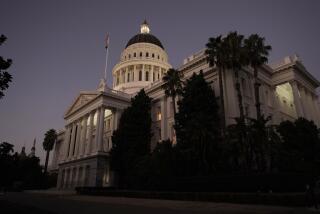Bipartisan legislation takes aim at online piracy
- Share via
Reporting from Washington — In a little-noticed bipartisan effort, House Republicans and Senate Democrats have agreed to press for new laws to crack down on “rogue websites” that sell pirated copies of movies, TV shows, music and video games or counterfeit goods like sportswear and prescription drugs.
“What these rogue websites do is theft, pure and simple,” said Sen. Patrick J. Leahy (D-Vt.), chairman of the Senate Judiciary Committee. “They are no more than digital stores selling stolen property. The Internet needs to be free and open — not lawless.”
These days, watching a free movie can be as easy as typing the words “watch movies” or “free movies” on Google.
“With just five clicks following a basic Google search, anyone can be streaming a stolen copy of almost any film,” Frederick Huntsberry, chief operating officer of Paramount Pictures, told a House committee last month.
Lawmakers are considering proposals that would authorize the Justice Department to quickly obtain court orders to shut down websites that sell pirated copies. Other measures would target credit card companies and advertisers that do business with the pirates. Google Inc. could be a target as well.
At a recent House hearing, lawmakers blamed the popular search engine for driving Internet traffic to websites that sell illegal copies. A Google lawyer said it was difficult to discern which sites deal in unlicensed goods, but Rep. Debbie Wasserman Schultz (D-Fla.) was unimpressed.
“You’re Google. You helped overthrow the head of a country in a weekend,” she said. “It’s more a question of a lack of will.”
Although the crackdown is being driven by the Hollywood entertainment industry, it has the strong support of authors, photographers, book publishers, the sports industry, labor unions and the U.S. Chamber of Commerce. Crackdown supporters cited estimates that online piracy costs the U.S. economy more than $100 billion a year. And as more commerce moves online, the threat to the legitimate economy grows, they said.
“Five years ago, pirating a book was largely a theoretical concern. But we have undergone a revolution since then,” said Brian Napack, president of Macmillan, a book publisher. Now tens of millions of readers are downloading books and reading e-books, he said, “yet most of our books and virtually every one of the top 10 bestsellers is available for free at websites all over the Web right alongside the authorized e-book stores such as Barnes & Noble and Amazon.”
The difficulty of stopping pirated goods has grown more complicated as high-speed Internet service has gone global. Many of the rogue websites are located outside the United States.
“It was easier when we worried about a guy selling counterfeit DVDs on the corner,” said Michael O’Leary, vice president of the Motion Picture Assn. of America. Now the problem is digital copies that show up for sale on websites that look legitimate. He said that no single solution would work, but that cutting off money to rogue websites was a good start.
But the proposal to seize or shut down websites has spurred a fierce reaction from Internet-rights advocates, who called Leahy’s bill a censorship measure that “runs roughshod over freedom of speech.” They said they feared giving the government the power to control part of the Internet and to close down websites before a full hearing could be held.
“This is what China does when they don’t like what they see on the Internet,” said Sherwin Siy, a lawyer for Public Knowledge, a Washington-based interest group that defends the rights of Internet users.
In mid-November, the Senate Judiciary Committee unanimously approved a bill to give federal prosecutors more power to charge websites with criminal infringement of copyrights, trademarks or patents if unlicensed copies or goods were being sold regularly. Armed with a court order, prosecutors could seek to block traffic to these websites and bar financial transactions with them.
That measure died at the end of the last Congress, but on April 4, Rep. Lamar Smith (R-Texas), chairman of the House Judiciary Committee, joined Leahy in announcing that they planned to move new legislation this spring. During hearings, bipartisan majorities in both committees said they favored strong new legislation.
This is not the first time that Congress has tried to protect copyrighted works on the Internet. The Digital Millennium Copyright Act of 1998 told websites that they had a legal duty to take down unlicensed works if they received a notice from the copyright owner.
Some say this “notice and takedown” procedure has worked as intended, but many lawmakers say it is slow and outdated in a world in which pirate websites refuse to comply.
“You could say it is a dial-up system in a new digital world,” Rep. Howard L. Berman (D-Valley Village) said. “If there is a perfect copy of a new movie on the Web for even for 24 hours, it can kill a huge part of the market.”
As for Google, “we have to persuade them or compel them” to stop sending traffic to pirate websites, Berman said.
More to Read
Inside the business of entertainment
The Wide Shot brings you news, analysis and insights on everything from streaming wars to production — and what it all means for the future.
You may occasionally receive promotional content from the Los Angeles Times.











